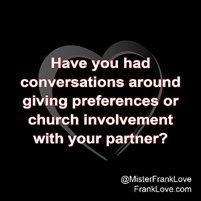In my previous blog, “A Future for Abusive Relationship,” we looked at the possibility that there may be ways to work through abuse in a relationship.
There is more power in the open hand than in the clenched fist. – Herbert Newton Casson
 I recently coached a couple who were talking and working through issues related to church involvement. It was quite interesting. Both placed great value on going to church. They each believed in God, and they each prayed for various things and hoped their prayers would be answered. However, one partner was more active than the other. River went to church and tithed regularly. Jordan went to church occasionally and tithed regularly.
I recently coached a couple who were talking and working through issues related to church involvement. It was quite interesting. Both placed great value on going to church. They each believed in God, and they each prayed for various things and hoped their prayers would be answered. However, one partner was more active than the other. River went to church and tithed regularly. Jordan went to church occasionally and tithed regularly.
As with most churches, there were services every Sunday, and there were occasional one-off special events. River planned to attend one of these special events and invited Jordon to join. Jordan did not want to. There wasn’t a particular schedule conflict, there was just a general preference not to go. In an effort to get Jordan out of the house and to church that day, River reminded Jordan that they prayed and asked for their prayers to be fulfilled. “Absolutely,” Jordan agreed.
“So just as we want God to take care of us, we must take care of God,” River said. Jordon responded with eye-rolling but agreed to participate.
This situation led me to think about how couples can address issues related to charitable giving and worship.
An invitation to do better or to do more can be a beautiful thing. We can be called on to give more money, give more time, give more attention. The list can go on and on. And while you can probably sense my preference toward giving openly by now, this is not the tendency or position favored by everyone. Some may say, “Instead of giving money, time, attention, or any other resource to others, we can keep it for ourselves.” This is understandable.
Conversations around giving preferences are foundational when selecting a partner. This is something to discuss meaningfully and early in the relationship. If giving is important to both, then conversations around how, what, and where can hopefully ensue. Remember, “giving” refers to more than money. Afterall, River and Jordan’s conflict was over time. If we’re still on the same page once those secondary issues have been examined, we are growing closer to creating a cohesive standard for how we make decisions when opportunities to give or worship are presented.
But what if we aren’t coming from the same place initially? What if our giving or worship preferences differ? The ability for partners to have honest and constructive conversations with one another in these situations is an essential skill. How we handle our differing views is a very big deal. If I say to my wife, “This is a big car,” and she says, “This is a little car,” we may or may not have a problem.
If I insist on having the car in front of us because it is a big car and she insists on a different car because she thinks my “big car” is small, we are not in a place of agreement. However, if I say, “This looks like a big car to me,” and she says, “I think it’s small, but let’s get that car,” then we have arrived at a place of agreement even though we may disagree or our perceptions may differ. We don’t have to see things exactly the way our partners do in order to make a decision that both parties feel good about.
 In the case of River and Jordan, they had differing perceptions around what was enough time to give to church (or God). In a situation of that nature, strongly consider giving more. If one partner is able to inspire or set the bar higher for the other, then consider allowing the bar to be set higher. This can be a beautiful form of motivation and inspiration—one where we are lifting as we climb and constantly moving the bar higher as we make our unit, our family, and our world a better place through our deliberate actions.
In the case of River and Jordan, they had differing perceptions around what was enough time to give to church (or God). In a situation of that nature, strongly consider giving more. If one partner is able to inspire or set the bar higher for the other, then consider allowing the bar to be set higher. This can be a beautiful form of motivation and inspiration—one where we are lifting as we climb and constantly moving the bar higher as we make our unit, our family, and our world a better place through our deliberate actions.
If one partner says, “I think we can do better than this,” or “We can give more,” or “We can focus more,” or “We can help more,” let’s respect their assertion and consider it from a place of allowing ourselves to be motivated. Ask (or pray) for more skills instead of less problems. Ask (or pray) for more guidance instead of fewer challenges.
I’m not suggesting that we give the house away. Or every dollar that we have. The suggestion asks that we be willing and open to doing more when our partner asks that we raise our goal.
This can be very loving.
Keep Rising,
Frank Love
In my next blog post, “A Way To Have Our Partners’ Back,” I will discuss the damage that unsupportive comments can inflict on partners in loving relationships.
Watch Frank Love’s presentation “The Act of Caring.”
Subscribe to receive Frank’s weekly blog.
Become a sponsor of Frank Love and his work creating loving cultures in our relationships with a monthly contribution of as little as $2. Sign up today at Patreon.com/FrankLove.
–—–—–—–—–—–—–—–—–—–—–—–—–—–—–—–—––
Each week, Frank Love hosts Zoom support group meetings that assist women and men as we work to create a loving culture in our relationships. Calls occur from 7 p.m. to 8:30 p.m. EST and can be accessed by visiting FrankWeeklyCall.com.
- Tuesdays—Black Women: Creating a Loving Culture in Our Relationships
- Thursdays—Black Men: Creating a Loving Culture in Our Relationships
–—–—–—–—–—–—–—–—–—–—–—–—–—–—–—–—– –
Frank Love coaches individuals toward creating a loving culture in their family. He is also the author of Relationship Conversations You Don’t Want to Have (But Should Anyway) and 25 Ways to Be Loving. To schedule a free consultation, contact Frank at Frank@FrankLove.com.

